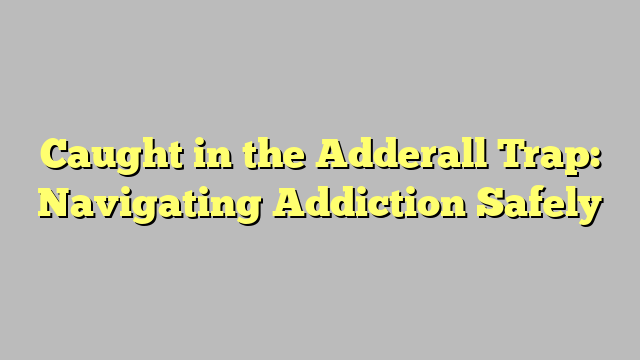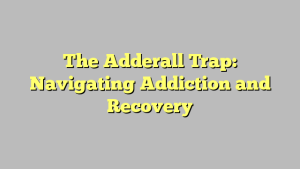Adderall addiction is a growing concern in today’s society, impacting individuals of all ages. What was once seen as a treatment for conditions like ADHD can easily spiral into addiction for many users. The accessibility and perceived benefits of Adderall have contributed to its misuse and abuse, leading many individuals down a dangerous path towards dependency. Recognizing the signs of Adderall addiction and understanding how to navigate this challenging issue safely are crucial steps in addressing this issue effectively.
Understanding Adderall Addiction
Is Adderall Addictive
Adderall addiction can begin innocently enough, often starting with a legitimate prescription for treating conditions such as Attention Deficit Hyperactivity Disorder (ADHD) or narcolepsy. The medication’s stimulant properties can lead to increased focus, energy, and productivity, making it appealing to those seeking enhanced performance in academics, work, or other areas of life.
However, over time, the body can develop a tolerance to Adderall, requiring higher doses to achieve the same effects. This can easily spiral into dependence and ultimately addiction, as individuals may find themselves unable to function without the drug, experiencing withdrawal symptoms when attempting to reduce or stop its use.
Recognizing the signs of Adderall addiction is crucial for early intervention. Common indicators include an inability to control or reduce use, neglecting responsibilities in favor of obtaining and using the drug, and experiencing negative consequences such as financial problems, relationship issues, or declining physical and mental health.
Navigating Recovery
Recovering from Adderall addiction is a challenging journey that requires patience and dedication. It is essential to seek professional help and support from loved ones to navigate this process successfully. Establishing a strong support network can provide encouragement and guidance as you work towards sobriety.
In addition to seeking professional help, implementing healthy lifestyle changes can aid in the recovery process. Engaging in regular exercise, maintaining a balanced diet, and incorporating stress-relieving activities into your routine can help alleviate withdrawal symptoms and promote overall well-being. Prioritizing self-care is crucial in rebuilding your physical and mental health post-addiction.
Furthermore, setting realistic goals and milestones can help track your progress and maintain motivation throughout the recovery journey. Celebrate small victories along the way and remember that recovery is a gradual process. By staying committed to your sobriety and embracing a positive mindset, you can navigate the challenges of Adderall addiction with resilience and determination.
Seeking Professional Help
If you are struggling with Adderall addiction, seeking professional help is crucial. A qualified therapist or counselor can provide personalized support and guidance to help you navigate your addiction journey effectively.
Therapy sessions can offer a safe space for you to explore the root causes of your Adderall use and develop healthy coping mechanisms. A trained professional can also assist you in creating a tailored treatment plan that addresses your specific needs and challenges.
Additionally, seeking help from a healthcare provider can ensure that you receive proper medical intervention and monitoring throughout your recovery process. It’s important to work collaboratively with professionals who specialize in addiction treatment to increase your chances of successful recovery.






Recent Comments